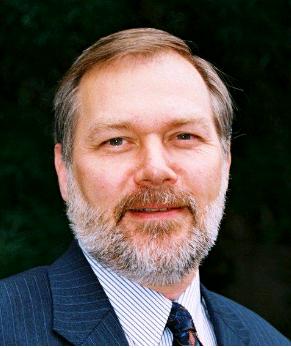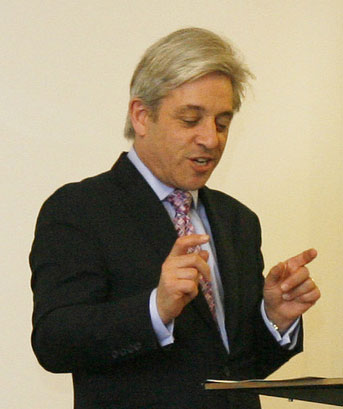‘Good, bad, ugly’ of gay rights 2012
Colin Stewart is a 45-year journalism veteran. He is the…
Chile, Uganda, Nigeria, Russia, Jamaica, Hungary, Slovenia, Malaysia, Iran, the United States, the United Nations, the Council of Europe.
Those are some of the primary contributors to a recent mix of progress and setbacks in the worldwide struggle for equal rights for LGBT people, says John Bercow, a longtime gay-rights advocate who is the Speaker of the British House of Commons.

While surveying recent events — “the good, the bad and the ugly,” he called them — Bercow also discussed why people should care about LGBT rights:
“Prejudice, intolerance and persecution on the basis of sexuality are a denial of humanity,” he said. “Such treatment is sentencing people to a life of fear, self doubt and self loathing. It is the theft of one of our most fundamental instincts – to love, and to be loved.
“This issue is so much more than politics or diplomacy. It is about the subjugation of a fellow human being’s freedom. It is painful. It is demeaning. It is dehumanizing. The examples which follow are not dry facts or cold entries in an index of injustice. They are human hurts which strike at the very being of millions of our fellow citizens across the world.”
Bercow touched on the following developments during a May 16 speech to the non-profit Kaleidoscope Trust, which works for the rights of gay, lesbian, bisexual and transgender people internationally.
PROGRESS
Chile. The Inter-American Human Rights Court ruled for a Chilean woman who had lost custody of her children due to her sexuality. “This is a historic ruling for the region because it clarified for the first time that sexual orientation and gender identity are categories protected against discrimination under the 1969 American Convention on Human Rights,” Bercow said.
In addition, after the “homophobic murder” of Daniel Zamudio, the Chilean Congress approved a bill that outlaws discrimination on the grounds of race, religion, gender and/or sexual orientation. It awaits the Chilean president’s approval.

Jamaica. The new prime minister, Portia Simpson-Miller, said she would review the country’s laws against homosexuality and would let lesbian and gay people serve in her Cabinet. “This was remarkable in the context of a close political contest in which the incentives to ‘play safe’ would have been considerable. If her words can be translated into deeds, then the impact in this region could be really seismic,” Bercow said.
Uganda. The gay rights group Sexual Minorities Uganda, or SMUG, sued American evangelist Scott Lively in a federal court in Massachusetts, accusing him of violating international law by inciting the persecution of gay men and lesbians in their country.

“This is the first known Alien Tort Statute case seeking accountability for persecution on the basis of sexual orientation and gender. Its implications may be seminal,” Bercow said.
Malawi. (Bercow did not mention the declaration by President Joyce Banda of Malawi that she hopes to repeal the country’s law against homosexual activities. That announcement made the news after Bercow’s speech.)
United States. (He also did not mention U.S. President Barack Obama’s recent declaration that he favors allowing gay marriage.)
International. Bercow did mention:
- The declaration by U.S. Secretary of State Hillary Clinton in December that “gay rights are human rights.”
- The March plenary session of the United Nations on LGBT human rights, sexual orientation and gender identification in Geneva, where the U.N. Human Rights Council reaffirmed its opposition to laws against homosexuality (leading to a walkout by representatives of many African and middle Eastern countries). “The debate affirmed that states have a duty under international law to protect the human rights of all persons. It was truly a defining moment,” Bercow said.
- “The Council of Europe has held its first-ever conference on the status of LGBT rights among its members. The UK Government declared that it would fund a LGBT Unit which would oversee the implementation of the Council’s recommendations.”
SETBACKS
Russia. The St. Petersburg City Assembly passed a law against “homosexual propaganda” that “effectively bans public events by LGBT people and organizations under the pretext of protecting minors.”
In addition, Bercow said:
Hungary. “These are not the only alarming signs from within our own continent. With St. Petersburg as the clear inspiration, an extremist party in Hungary has sought to ban television programmes that portray being gay as acceptable. The proposal would make such so-called promotion of homosexuality punishable by up to eight years imprisonment.
“In parallel, the Budapest police had rejected a request to hold the annual LGBT pride march there this summer. A court in Budapest reportedly overruled the police’s decision not to grant a licence in April. It appears that Budapest should now be able to host a Pride parade this year, but how the police will react if it does go ahead is another question.
Slovenia. “Meanwhile in Slovenia, citizens voted to reject a law that would have allowed gay couples to adopt the biological children of their parents. This is a surprising setback as this is a country in which homosexuality has been comparatively uncontroversial with a form of civil partnership registration in place for some six years now.”

Nigeria. The Nigerian Senate passed a bill to send people in same-sex marriages to prison for up to 14 years and people who help them for up to 10 years. “The European Parliament has called on the Nigerian Parliament to throw out the bill which, if enacted, would put LGBT people at serious risk of violence and arrest,” Bercow said.
Nigerian law already provides for prison sentences of up to 14 years for homosexual acts.
Uganda. The notorious bill to toughen the country’s already strong laws against homosexual acts was refiled in the current parliamentary session, but has not been acted upon.
“Although the ‘death penalty’ clause has now been dropped, it remains a pernicious piece of legislation that would introduce the penalty of life imprisonment for a person convicted of a gay act more than once,” he said.
“Another proposal from 2010 that blocks gay people from access to HIV prevention and treatment has also resurfaced in Kampala. These are very testing times,” Berow said.
Malaysia. A legal challenge failed to lift a ban on activists’ Sexual Rights festival.
In addition, Bercow said:
“In a state-inspired homophobic innovation, the Malaysian Information Department has sparked additional controversy by announcing an intention to ban television shows which feature gay characters. Exactly how this will be determined is a mystery but this is an unapologetic attempt to curb the so-called influence of LGBT activists in Malaysia.”
Death penalty. “At the most basic level, it still remains illegal to engage in same-sex conduct in 78 countries. In five nations — Iran, Mauritania, Saudi Arabia, Sudan and Yemen — the death penalty can be invoked for homosexual activity,” Bercow said.




I love your work Mr Stewart
Thanks for your kind words. I try, and it’s important.
Thanks for the informative article. I came across it whilst researching for a magazine article focused on the St. Petersburg “anti propaganda” law, and I’ll now make sure to mention what’s happening in Slovenia and Hungary – I wasn’t aware. It’s very important to spread the word, so thank you again!